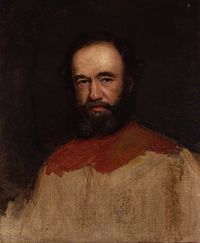James Outram (British officer)
| Sir James Outram, Bt | |
|---|---|

Sir James Outram
|
|
| Nickname(s) | The Bayard of India |
| Born |
29 January 1803 Butterley, Derbyshire, England |
| Died | 11 March 1863 (aged 60) Pau, Pyrenees-Atlantiques, France |
| Buried at | Westminster Abbey |
| Allegiance |
|
| Service/branch | |
| Years of service | 1819–1860 |
| Rank | Lieutenant General |
| Battles/wars | |
| Awards |
Knight Grand Cross of the Order of the Bath Knight Commander of the Order of the Star of India |
| Other work |
Resident Minister of Lucknow Chief Commissioner of Oudh |
Lieutenant-General Sir James Outram, 1st Baronet, GCB, KCSI (29 January 1803 – 11 March 1863) was an English general who fought in the Indian Rebellion of 1857.
James Outram was the son of Benjamin Outram of Butterley Hall, Butterley, Derbyshire, a civil engineer. His father died in 1805, and his mother, a daughter of James Anderson of Hermiston, the Scottish writer on agriculture, moved to Aberdeenshire in 1810. From Udny school the boy went in 1818 to the Marischal College, Aberdeen and in 1819 an Indian cadetship was given to him. Soon after his arrival at Bombay his remarkable energy attracted notice, and in July 1820 he became acting adjutant to the first battalion of the 12th regiment on its embodiment at Poona, an experience which he found to be of immense advantage to him later in his career.
In 1825, he was sent to Khandesh, where he trained a light infantry corps, formed of the Bhils, a tribe native to the densely forested hills of that region. He gained over them a marvellous personal influence, and employed them with great success in checking outrages and plunder. Their loyalty to him had its principal source in their admiration of his hunting achievements, which in cool daring and hairbreadth escapes have perhaps never been equalled. Originally a puny lad, and for many years after his arrival in India subject to constant attacks of sickness, Outram seemed to gain strength by every new illness, eventually acquiring a strong constitution and "nerves of steel, shoulders and muscles worthy of a six-foot Highlander."
...
Wikipedia
